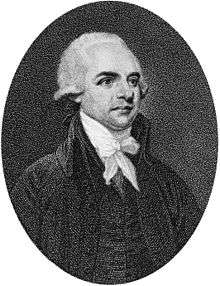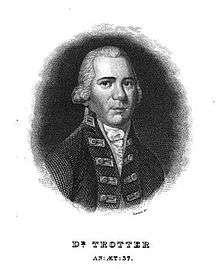Thomas Trotter (physician)
Thomas Trotter (1760–1832) was a Scottish naval physician and author who was a leading medical reformer in the Royal Navy and an ardent critic of the slave trade.[1] Trotter was born in Melrose, Roxburghshire, and studied medicine under Alexander Monro (secundus) in Edinburgh.

Life
Born in Roxburghshire in or about 1760, he studied medicine in Edinburgh. As surgeon's mate, he served on HMS Berwick in the Channel fleet in 1779, in the battle of the Doggerbank in 1781, and (apparently) at the relief of Gibraltar in 1782. He was then promoted to be surgeon; but as the reduction of the navy after the peace held out little prospect of employment, he engaged himself as surgeon on board a Liverpool Guineaman (slaver), and had medical charge of a cargo of slaves across to the West Indies. An outbreak of scurvy on board fixed his attention on the disease.[2]
Trotter pursued medical studies in Edinburgh, and graduated M.D. in 1788. During the Spanish armament of 1790, he was appointed by Vice-admiral Robert Roddam, to be surgeon of his flagship HMS Royal William, and in 1793 was surgeon of HMS Vengeance for a voyage to the West Indies and back. In December he was appointed second physician to the Royal Hospital at Haslar, near Portsmouth, and in April 1794 was nominated by Lord Howe physician to the Channel fleet. In this capacity he served through the campaigns of 1794 and 1795, was present in the battle of 1 June 1794, appears to have been with Cornwallis on 16–17 June 1795, and to have joined the fleet under Lord Bridport very shortly after the action of 23 June. When going on board one of the ships to visit a wounded officer, he was accidentally ruptured, and rendered incapable of further service at sea.[2]
Trotter was granted a pension; he settled in private practice at Newcastle, which he gave up, but continued to write, mostly on professional subjects. He died at Newcastle on 5 September 1832. He was twice married.[1][2]
Publications
At the age of 16 Trotter wrote verses which were published in Walter Ruddiman's Edinburgh Magazine in 1777 and 1778. His M.D. dissertation was De Ebrietate ejusque effectibus in corpus humanum, published in English as An Essay, medical, philosophical, and chemical, on Drunkenness, and its Effects on the Human Body (1804; 4th edit. 1812). In England, while in private medical practice at Wooler in Northumberland, he wrote up his notes on scurvy to order, and published them as Observations on the Scurvy (1786; 2nd edit., much enlarged, 1792). Treatment for scurvy had been demonstrated by James Lind in his Treatise of 1754; Trotter corroborated Lind's thesis by extensive observations. In 1795, through Sir Gilbert Blane, the Admiralty endorsed the general use of lemon juice.[2]
Other works were:

- A Review of the Medical Department in the British Navy, with a Method of Reform proposed, 1790.
- Medical and Chemical Essays, containing additional Observations on Scurvy ... 1795; 2nd edit. 1796.
- Medicina Nautica: an Essay on the Diseases of Seamen, vol. i. 1797; vol. ii. 1799; vol. iii. 1803.
- Suspiria Oceani: a Monody on the death of Richard, Earl Howe, 1800.
- A Proposal for destroying the Fire and Choak Damps of Coal Mines ... 1805. This work brought two controversial replies, from Henry Dewar and "A Friend to Rational Schemes of Improvement".[3]
- A Second Address to the Owners and Agents of Coal Mines on destroying the Fire and Choak Damp, 1806.
- A View of the Nervous Temperament; being a Practical Treatise on Nervous, Bilious, Stomach, and Liver Complaints 1807; 2nd edit. 1808.
- The Noble Foundling, or the Hermit of the Tweed: a Tragedy, 1812.
- A practicable Plan for Manning the Royal Navy ... without Impressment. Addressed to Admiral Lord Viscount Exmouth, 1819.
- Sea Weeds: Poems written on various occasions, chiefly during a naval life, 1829.[2]
Trotter contributed also to the European Magazine, Medical Journal and other periodicals.[2]
References
- 1 2 Wallace. "Trotter, Thomas (bap. 1760, died 1832)". Oxford Dictionary of National Biography (online ed.). Oxford University Press. doi:10.1093/ref:odnb/27763. (Subscription or UK public library membership required.)
- 1 2 3 4 5 6
 "Trotter, Thomas". Dictionary of National Biography. London: Smith, Elder & Co. 1885–1900.
"Trotter, Thomas". Dictionary of National Biography. London: Smith, Elder & Co. 1885–1900. - ↑ Durham Mining Museum, Robert L. Galloway, A History of Coal Mining in Great Britain, Ch. XIV.
External links
- Attribution
![]() This article incorporates text from a publication now in the public domain: "Trotter, Thomas". Dictionary of National Biography. London: Smith, Elder & Co. 1885–1900.
This article incorporates text from a publication now in the public domain: "Trotter, Thomas". Dictionary of National Biography. London: Smith, Elder & Co. 1885–1900.